How Blue Is My Valley Read online
Page 13
There is something cave-like about a forest dripping in mist and we shake off the damp with a coffee in ‘L’oiseau sur sa branche’. Half the tables are laid for lunch and it will doubtless be full but we had no idea how popular the restaurant is when we arrived there last summer, hot and hungry, hoping for a sirop and a sandwich.
Tables spilled across the terrace to the very edge of the village road and as one set of occupants rose, another took their place. The waitresses whisked mats, steaming plates and chilled bottles of red in a quick dance between customers and we had little hopes of ‘just a sandwich’ but we tried anyway.
The inevitable ‘no, we only do lunches,’ left us nursing our mint sirops disappointed and hungry, but not hungry enough in the heat to appreciate the plates piled with filo pastry concoctions or casseroles. There was no chance of any shops being open during lunchtime and no cafés within ten miles and we must have looked pathetic enough to touch a maternal chord because back came our waitress with the suggestion that we could have a dessert ... how about apricot tart? Every mouthful of that tart was true ambrosia, sweetened with sunshine.
The chef of ‘l’Oiseau sur sa branche’ wears what I think of as full whites, despite the fact that his restaurant interior is about the size of my living room, and his credo is engraved in a window; ‘Here, we do not acknowledge any hindrance to free speech, to the exchange of ideas, to utopias or to dreams. We do not accept any brakes or restraints to the exercise of free will. The only law is the challenge of debate.’ Who needs Paris and the left bank?
I consult the bird book but it is inconclusive. The white bits seem to have been in the wrong place but in the mist, and in flight, who knows ...
At least I know a cormorant when I see one, and they hang out in gangs exactly where you would expect them to, on sandbanks and driftwood in the Montélimar canal, with views of apartment blocks and industrial wasteland. Like urban foxes, cormorants make the most of what they find, and my ex-colleagues in Port Talbot still wave to my talisman, who sits on a lamp-post above the central reservation on the M4, on the slope down from Baglan to the city God would like to forget.
Every day for three years, driving to and from work, I looked for his silhouette, the U-bend neck, wings outstretched like the eagle in a Roman standard as he dried them or hunched in sleep. To see him was to start the day right, like a marital kiss, and to catch him in flight between his lamp-post and the docks, was a moment’s magic. He vanished just before I left too – moving on, I wondered? Dead, I was told by jolly workmates, squashed on the motorway.
One of the same jolly workmates phoned me six months later – not only was my cormorant back but he had company. If ever you drive along the M4, between Baglan and Port Talbot, where the steelworks spouts gray clouds and the clouds spout gray rain, look up. If the water sprite, or one of his friends, is there, he’ll shake off the rain, stretch, in his element. He might visit his new statue on Llanelli promenade, approve it and play on the sandspits for the summer, but he’ll always go back to the power station and the bare hills opening into the south Wales valleys.
Montélimar’s cormorants have rich pickings. The wind tears our eyes, rips our uncovered ears raw, as we count the seconds. We lose count and the diving bird reappears like a magician, impossibly distant, in a different direction from where it first went under. The U-bend of the throat contorts – we have seen eels two-foot long succumbing to a bird’s determination, even reappearing - only to go down again as another gulp dooms the wriggling prey – and breakfast is gone.
It is now two weeks since the fitters went for lunch and their ladder is still where they left it. We have, as they say, moved on (which means that when the builder said ‘We can knock the wall and stairs down on Thursday’ and we replied, ‘Fine’, the slightly-unfinished-kitchen ceased to be a priority). Besides which, we are busy with more-to-life and preparation for a visit to the doctor to organise a routine prescription.
If John is ill, he considers it too stressful (when he’s feeling ill anyway) to go to the doctor’s and if he’s well, there’s no point in going, is there. This interesting logic impacts even more when the language of consultation will be French. I talk him into a visit (when he’s not ill of course – I’m not that brave), we agree that doctors all speak a different language anyway and John swots the relevant chapter in his French lessons while I play with the big dictionary. ‘Pins and needles’ turns out to be ‘fourmis’, ‘ants’ and as we learn new vocabulary, we are disappointed not to have more medical problems – what a waste of all our new words.
Before leaving Wales, we asked our local G.P., or rather the receptionist, for our medical files. There are receptionists and there are rottweilers; this was the latter, who behaved as if we were asking her to break the Official Secrets Act and defect to England.
When the photocopied files arrived, I read them as if they were the latest best-seller, crammed with sex and violence – and they probably are, if you know the stories behind the ‘three stitches in forehead’ (good one, that – I was dripping blood all over Llanelli’s A & E and, as they do, the doctor said, ‘Now then, what seems to be the matter?’) or the one which starts ‘vomiting since 4pm, ate oysters on 28/8...’ It is like being a child again, eavesdropping, or reading notes between teachers who mention your name, and I am fascinated by the letters between GP and specialist, referring John because of a frozen shoulder or some such problem.
From specialist to GP, ‘Thank you for referring this very pleasant 57 year-old...’.
From GP back to specialist, ‘Thank you for seeing this very pleasant 57 year-old...’ What if he hadn’t been very pleasant?
I check my own file but all I find is the odd space which suggests that something was carefully blanked out of the photocopying. I draw my own conclusions ... ‘This very **** **** **** of a 47 year old?’
I do not communicate well with doctors. I don’t understand this as my Welsh vet became my friend and already I like and trust my vet in France, even if I don’t share his enthusiasm about dog interior design. Doctors, on the other hand ...
There was the one who suggested I might have got the idea that I had a vaginal infection because there was a lot about it on television at the moment... I changed doctors.
There was the one who always prescribed orange juice, particularly but not only in situations where he wouldn’t want to give antibiotics because people use too many of them generally. My difficulties have not just been with male medics, and not just with doctors. There was the female nurse who gave me instructions on when to take a tablet and when I asked what it would do, said ‘You’ll find out soon enough’ and laughed. I was a very naiive young woman, in hospital, and it was a suppository.
I have given a reading from my first novel in a stroke ward where the nurses were too busy to do more than park a few victims in the day room, my lively, lovely mother among them, and leave me to work out whether four of them were still alive at the end of the reading (they were – they could hold the bookmark I gave each of them).
There have also been angels - a midwife who listened and believed and a G.P who did prescribe penicillin - but not enough of them. The U.K. system seems to work on the principle that if people wait long enough for treatment, enough of them will die to save money and enable the system itself to stagger on.
In fairness, I must confess that I am not a good patient. I feel sorry for the nurse who asked me what my religion was – she was only doing her job, filling in forms – and when I replied, in a very foul mood, ‘Indeterminate,’ she asked innocently, ‘In the what?’
There are few times I come away from consultation anything other than deeply depressed or pathologically steaming. The only time I remember being actually elated was thanks to a Llanelli chiropodist with a Geordie accent, who asked me to bring in my shoes for his consideration.
‘All of them?’ I asked, the Imelda Markos of Llannon. We settled on me showing him a selection and I spent a happy half-hour selecting my favo
urite shoes.
I felt my entire shopping habits were justified when I sneaked a look at the letter he wrote referring me to a Sports Podiotrician, ‘The lady has excellent shoes.’ My husband has grown very tired of the quotation.
Our comedy double act at our new, French doctor’s is therefore dogged with bad history, and we shuffle our feet and our brains as we inspect the African wall-hangings or flick through magazines.
The receptionist is a pussy-cat, there is only a five-minute wait and we make a good start. We hand over the Gill/Pilborough dossier and I wonder what a French doctor will make of my ‘very pleasant man’.
He manages to convey his disdain for the British system without actually being rude; he offers a ‘more modern’ prescription and he can arrange for a consultation with a specialist within three weeks, if desired.
Our notes are exactly that – our notes. We get them back to show to whichever medical consultant we choose and our health - or unhealth – is more within our own control than I have felt it to be for years.
I know that the French Health Minister resigned last year because so many older people died, in homes and hospitals, during the exceptional heat; I know that there are problems supporting the current system financially; but, as someone who grew up assuming that the British National Health system was the best in the world, and who has been let down by it, I feel that I and mine will be better cared for here, in Dieulefit.
12.
Parsnips and Partisans
Spring is dancing around winter, one day flaunting bluebells and primroses in the sunshine, then, the next, stilled by a snowfall. Early one morning at the end of February we see four black-tipped ears in the orchard as two hares play advanced kiss-chase. Apart from this one occasion, we never see more than one hare – do they take turns in teasing us? I look forward to March madness – but perhaps this needs another male? I read of an Australian woman boxed to the ground in her own garden by a kangaroo that bounded out of the neighbouring woods. I think I could take on a hare, even one in a very bad mood.
Vs of birds migrate north and the first summer visitors arrive to replace them, among them a black and white songbird that displays bright yellow when it spreads its wings and wagtails that don’t walk like wagtails. For the first time ever my garden will display daffodils for St David’s Day, the first few just frilling their petticoats along the garden path. Local lore tells me that, at the beginning of March, gangs of Montiliens (people from Montélimar) head into the countryside to pick wild daffodils. Monsieur Speedy and his kitchen-fitters skipping through the fields with bunches of daffodils? I think not.
It comes as a shock to hear from the kitchen designer – it is now three weeks since his boys went off to lunch and their ladder is still resting against our wall. It seems that the designer has been very ill, in hospital, is now sorting out our ‘little concerns’; we forgive him, agree on what’s left to do, part friends – and another three weeks goes by.
Instead of the sunset window of our Welsh home, here we have the sunset wall, the same one which glows pink at dawn, turns evenings golden, shadows and silhouettes sharpened by the spring rain. We are still discovering our own home, which gives us presents daily, some more practical than others. We find five wooden troughs in an outbuilding and paint them into flower-planters. A wooden pole with a round end becomes a tool to tamp down mortar around the legs of the new pergola. I mix the mortar, stirring the giant gray cake mix until it turns into hippopotamus mud.
While we work we can hear the woodpecker drumming and the songbirds’ ‘carpe diem’ insistence is echoed by one neighbour’s rotivator, another’s tractor. No-one forgets that summer is coming – or what last year’s was like, not a cloud nor spot of rain for four months.
We plant our tomatoes with some hope that here they might just ripen and we consult our French gardening book for more adventurous seeds. We are informed not only of planting times and distances, but also which combinations are friendly and which unhelpful, and even which phase of the moon is ideal for each planting.
We have not yet taken on consideration of the moon but I am closer to understanding the tendency when I look out my bedroom window and see the Evening Star or the Dog Star, so bright I wonder if I have ever really seen them before.
There is indeed a new star in the sky, or rather a previously undiscovered planet now officially recognised. If a planet twinkles and no-one sees it, does it exist? Whatever the philosopher’s answer, Sedna is now categorised by humans. I look out the window and say ‘Sedna’ but it sounds to me like office-workers spotting the tea-lady (‘S’Edna’) and I have forgotten what I once knew, that Sedna is an Inuit spirit, an earth-goddess, and I feel guilty for my irreverence when someone reminds me. Language trips me up once again with its ‘faux-amis’, its sound-alikes.
My French is improving but television programmes still leave me inventing half the plot and consequently confused by endings which convict the guy I thought was the hero. It’s as if my hearing gives up completely at times, the worst being in ‘Lord of the Rings’ (luckily, as the subtitles revealed, they were speaking Elvish), with ‘Shogun’ a close second (no subtitles and no distinction between the dubbed French and the original snatches of Japanese).
It is getting harder to think of anything we need from Britain as we find what we need here or substitute the local product. Up to now, visitors have brought everything from videos of our favourite English TV detectives to pasta flour (interesting potential conversation at customs; ‘So, you’re saying that this white powder is in fact flour... and they don’t have flour in France?’)
As keen owners of a bread-making machine, we find it more difficult to get a range of specialist flours here than in Wales. My Pyrenean brother-in-law went one stage further and wrote to ‘Good Housekeeping’ before moving to France to ask where he could buy suitable flours here. He received a very sarcastic reply, on the lines of ‘I think you’ll find that the French do know how to make rather good bread ...’
A few disastrous attempts to use various French flours taught me quickly that they are completely different, seem generally to give more volume for the same weight and anything other than the basic Type 55 sinks your loaf like lead, so British flours are still welcome presents. The oddest nostalgic craving we’ve suffered has been for parsnips.
We have scoured the markets and supermarkets, which display everything you could imagine from lychees to oak-leaf lettuce, but no parsnips. There was nothing for it but to start from scratch and John duly returned from a weekend in London with a packet of parsnip seeds (and eight gas canisters for my hair curler, also inexplicably non-existent here). Another interesting potential customs conversation; ‘You do realise Mr Pilborough that there are no parsnips in the whole of France because they carry the deadly francophobe virus which springs into life at the first ‘oui’.’
I worry about the possibility that I am married to a smuggler of illegal vegetables and I look up ‘parsnip’ in my French gardening book – a full, reassuring double spread rewards me. It stands to reason that if it’s in my Traité Rustica, then they grow it in France. But then why is the region that produces four-fifths of the nation’s vegetables bare of parsnips?
It is when I am clearing an area of scrub and hardcore that the garden gives me its most unexpected present. The patch is a wilderness just outside our walled garden, but for all the old bricks and stones, the soil is rich and black, and last autumn a crop of courgettes suddenly ripened amidst the weeds, so this must have once, long ago, been cultivated.
I tug on yet another stone and it gives a bit in my hand. I recognise the greenery just sprouting on its white top and I carefully uproot the conical white root. This could be the only parsnip in the whole of Provence and I am truffle-proud. I tell John that it is a sign and I ignore his reply.
Thursday 11th March hits the whole country, the whole of Europe and further, as a sign of a different kind. No home can shut out the trains bombed in Madrid, the thousand injured
, the official tally of one hundred and ninety dead – and how many of these because the emergency services could not cope?
My Pyrenean sister now lives near Basque country, where the sense of outrage runs high over anyone thinking for a minute – let alone the government proclaiming it ‘probable’ - that Eta carried out the attack. My sister tells me that there is a man who was in New York on September 11th, lost friends there and moved with his family to somewhere safer – Madrid.
I think of the old story where a man sees Death walking along his street. Death is surprised to see him but the man runs... and runs, right around the world, where, the very next day, Death comes for him, saying ‘I couldn’t believe it when I saw you yesterday because I knew I was to meet you here, today.’ To have escaped, when your friends have not, is hard. To do it twice?
It is the aftershock which shakes me. If the elections had been on the Wednesday, the government would have remained in power... it falls, and the swing in voting has some kind of moral I do not understand. However, I do understand that I might have to carry my suitcase on my lap when I take the train on my way to Paris, that the airport staff will not smile at me when my hairslide makes the metal bleeper go off, that when I travel I am a potential terrorist and will be treated as such. I understand the old lesson of the old story, that nowhere is safe...
but some places are safer than others. Since we moved here, Dieulefit has had what counts locally as a crimewave. It had its first murder for twelve years (no contest for Llanelli’s tally), a dispute between neighbours in an apartment block. The excitement of having real news (and being able to drop the detailed account of each stall in Nyons market) sent the local paper into reporting frenzy. Everyone and his cat was interviewed and all agreed that the victim was ‘sans histoire’. I can think of no worse epitaph than to be described as a woman ‘with no story’ and even now I know that ‘histoire’ was being used in the sense of ‘a record’, it is a phrase that haunts me. Everyone has a story, including a man who died in accidental violence and whose balcony could be recognised as the only one covered in flowers, his life brightened by all manner of hanging baskets and containers.

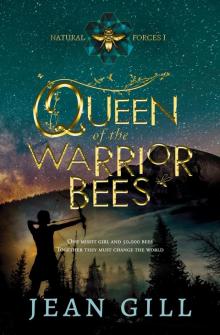 Queen of the Warrior Bees
Queen of the Warrior Bees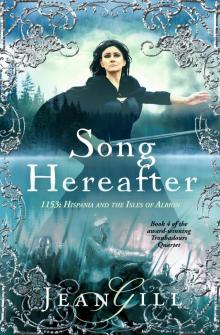 Song Hereafter
Song Hereafter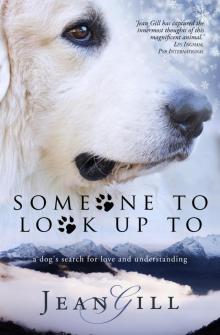 Someone to Look Up To
Someone to Look Up To Bladesong
Bladesong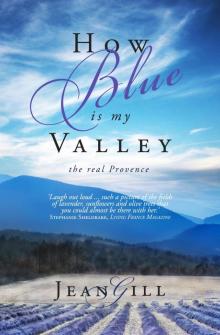 How Blue Is My Valley
How Blue Is My Valley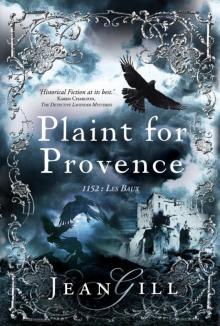 Plaint for Provence
Plaint for Provence Song at Dawn: 1150 in Provence (The Troubadours Quartet)
Song at Dawn: 1150 in Provence (The Troubadours Quartet)